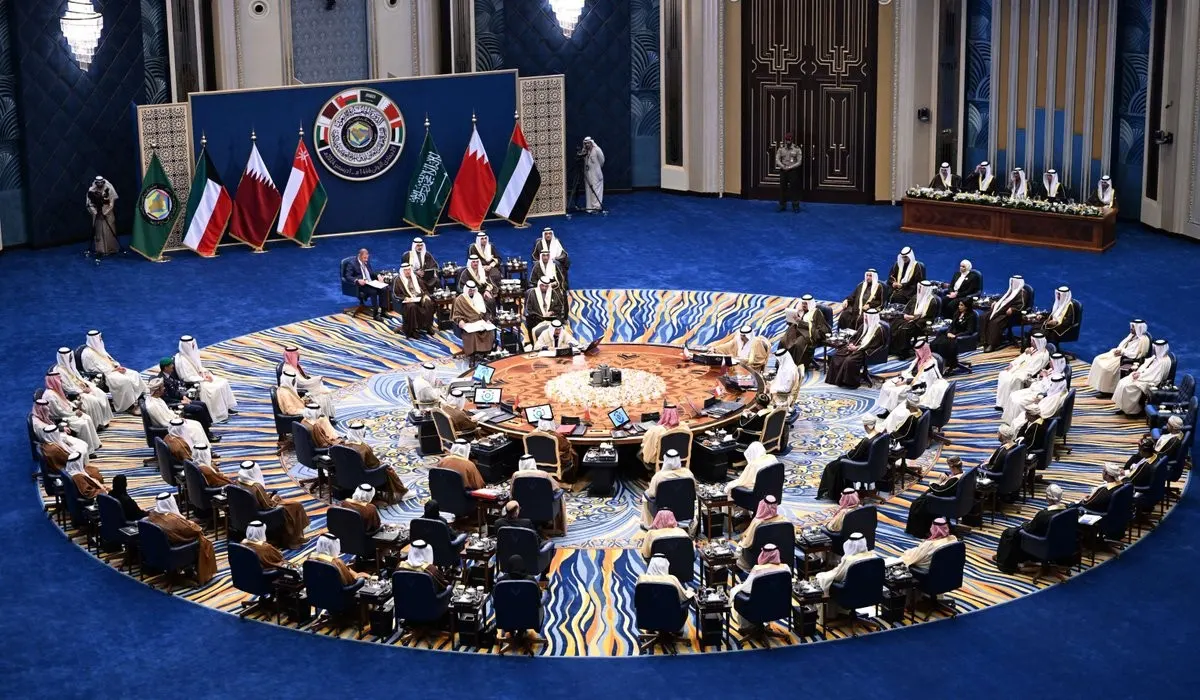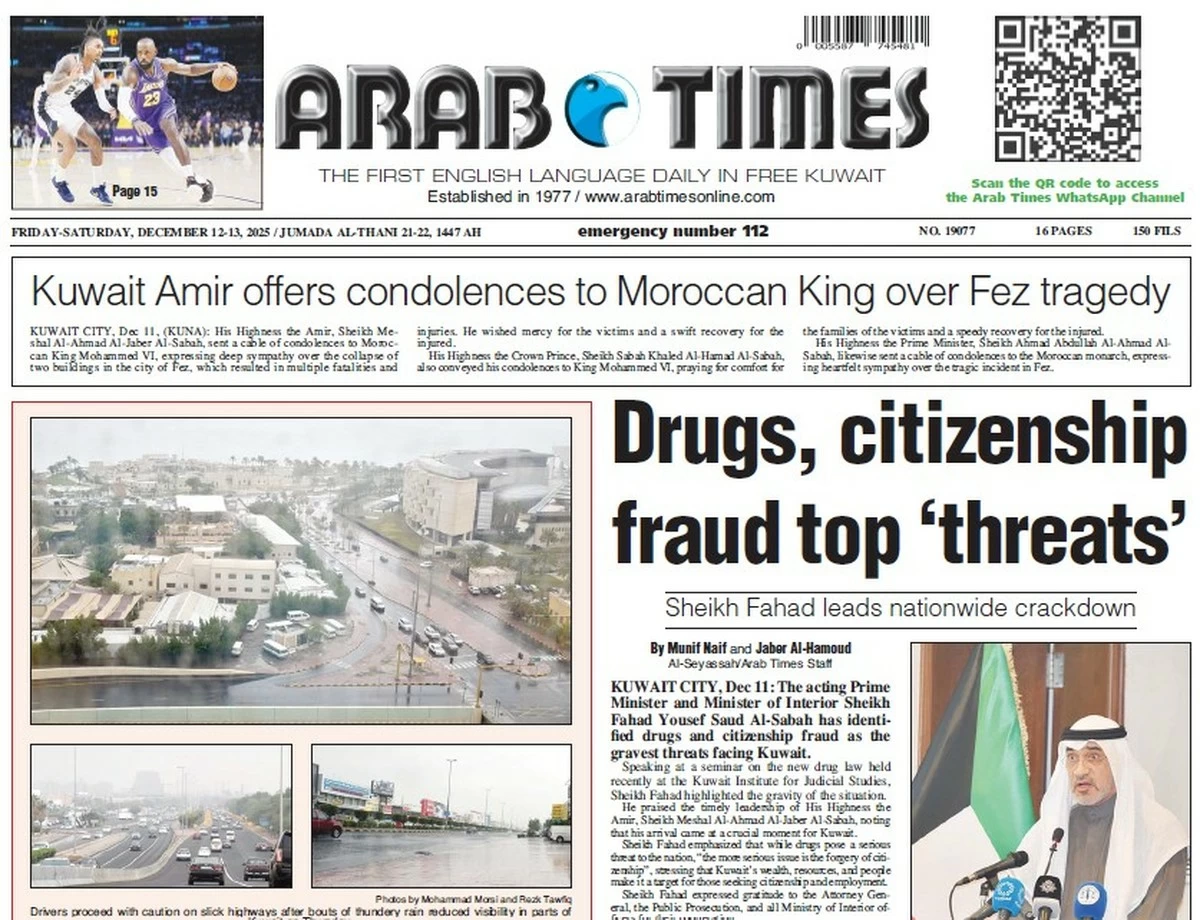01/12/2024
01/12/2024

KUWAIT CITY, Dec 1: On Sunday, the leaders and representatives of the Gulf Cooperation Council (GCC) called for an immediate end to the war crimes in Gaza, the displacement of its population, and the Israeli occupation of Palestinian territories. They reaffirmed their unwavering stance on the Palestinian cause, emphasizing their support for Palestinian sovereignty over all territories occupied since June 1967 and the establishment of an independent Palestinian state with East Jerusalem as its capital.
In the "Kuwait Declaration" issued by the 45th session of the GCC Supreme Council, hosted in Kuwait, the leaders highlighted the growing role of GCC states in addressing regional and global political, security, and economic challenges. They also praised the contribution of GCC countries to resolving issues that threaten peace, security, and stability, and to enhancing international dialogue and communication among peoples.
The leaders called for intensified efforts to solidify the GCC's role and elevate the region's status as a global business and economic hub. They also emphasized the need for continued sustainable economic diversification, digital transformation, energy market stability, and successful climate change management.
The declaration reads:
In line with the high goals upon which the Gulf Cooperation Council was established in 1981—chief among them supporting just Arab and Islamic causes—His Majesty and Highnesses, the leaders of the GCC countries, discussed, at the 45th session of the Supreme Council held in Kuwait on Sunday, December 1, 2024, the critical challenges facing the region. These included the Israeli aggression on Gaza, Lebanon, and the West Bank, as well as violations in Jerusalem and at Islamic and Christian holy sites.
The Supreme Council called for an immediate end to the crimes of killing, collective punishment, the displacement of residents, and the destruction of civilian infrastructure in Gaza, including health facilities, schools, and places of worship—actions that constitute clear violations of international law and humanitarian principles. The Council further called for immediate intervention to protect civilians, halt the war, and sponsor serious negotiations to achieve sustainable solutions. They reaffirmed their firm position on the Palestinian cause, calling for an end to the occupation, the establishment of an independent Palestinian state with East Jerusalem as its capital, and the protection of refugees' rights in accordance with the Arab Peace Initiative and international resolutions.
The leaders welcomed the decisions made at the extraordinary Arab-Islamic summit hosted by Saudi Arabia on November 11, 2024, aimed at enhancing international efforts to stop the war in Gaza, achieve permanent peace, and implement the two-state solution as per the Arab Peace Initiative. They also commended Qatar's efforts to cease fire in Gaza and facilitate the exchange of detainees.
The GCC leaders condemned the ongoing Israeli aggression in Lebanon, warning of the dire consequences of its continuation and the expansion of the conflict, which could have catastrophic effects on the region’s peoples and global peace and security. The Council welcomed the temporary ceasefire agreement in Lebanon and expressed hope that it would lead to a permanent end to the war, Israel's withdrawal from Lebanese territory, the implementation of Security Council Resolution 1701, and the return of displaced persons.
The leaders reiterated their full solidarity with the Lebanese people and recalled Kuwait and the GCC's efforts in Lebanon. They urged Lebanese leaders to prioritize national interests and resolve differences through political dialogue, reinforcing Lebanon's role in preserving Arab security and culture and maintaining strong relations with GCC countries.
The leaders also expressed appreciation for the ongoing efforts by Saudi Arabia and Oman to revive the political process in Yemen, and emphasized the peaceful approach of the GCC countries. They underscored the importance of dialogue and diplomacy to resolve regional and international differences in accordance with international law, the United Nations Charter, and respect for state sovereignty and territorial integrity.
The leaders praised the growing role of GCC countries in addressing regional political, security, and economic challenges, as well as their contributions to resolving issues threatening peace and stability. They called for the continued implementation of decisions made at GCC summits and ministerial meetings, with specific timelines to ensure effective results.
The leaders directed the GCC states to intensify efforts to consolidate the region's role as a global economic and business center, and to continue pursuing sustainable economic diversification, stability in energy markets, and addressing climate change. They also emphasized the importance of swiftly implementing decisions agreed upon within the Cooperation Council to meet the needs and aspirations of GCC citizens.
In terms of social development, the leaders expressed a commitment to empowering Gulf women and enhancing the role of youth in the region. They recognized the significance of universities, research centers, and thought leaders in preserving Gulf identity, Arab culture, Islamic values, and principles of good governance.
Within the context of economic diversification, the leaders stressed the importance of the digital economy as a key pillar for future development in the region. They highlighted the historic opportunity posed by the digital economy to enhance growth and integration among GCC countries.
The leaders praised the region’s advanced digital infrastructure, including investments in fifth-generation networks, fast communication technologies, and large data centers, which position the GCC countries as global leaders in the digital economy. They underscored the importance of strategic investments in artificial intelligence, big data, cloud computing, and cybersecurity, recognizing these technologies as key to the region’s future economic growth.
The leaders called for enhanced cooperation among GCC countries to develop digital strategies that promote integration, such as facilitating e-commerce, improving digital payment systems, and supporting cybersecurity. They also emphasized the need to accelerate efforts to establish unified digital markets that will enhance regional economic integration and boost global competitiveness.
The leaders stressed that the GCC’s diverse resources and advanced human and technical capabilities allow them to make significant contributions to the global economy. They also recognized that GCC digital initiatives extend beyond national goals, aiming to support global innovation and economic growth, thus strengthening the region’s role as a major digital economic power.
Finally, the leaders emphasized the need to continue developing digital infrastructure and adopting emerging technologies, while developing skilled human resources to lead digital transformation. They affirmed that the GCC countries’ vision for the digital future balances innovation with environmental and social sustainability.
The declaration concluded by reaffirming the GCC’s commitment to adapting to global developments, enhancing the well-being of its people, and reinforcing its role as a global hub for the digital economy, ensuring sustainable prosperity for the region and the world.


